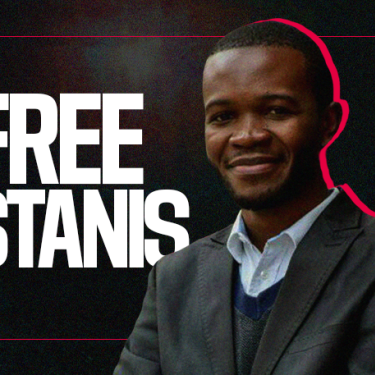Investigation file on Stanis Bujakera exposes arbitrary nature of Congolese journalist’s detention

Reporters Without Borders (RSF) has seen the file of the police investigation into Stanis Bujakera, a journalist in the Democratic Republic of Congo who is currently being subjected to a trial at which no evidence has been produced to support the charge that he fabricated an intelligence agency memo. The file shows that his detention is as arbitrary as the trial itself, in which the next hearing is scheduled for 22 December, two days after the first round of the DRC’s presidential election.
“From questions aimed at discovering Stanis Bujakera’s sources to the total absence of evidence that he transmitted this memo to anyone, and a bogus expert report about his phone’s ‘DNA’ in the memo, the only 'DNA' that exists in this investigation file is that of arbitrariness. We ask the court to quickly release this journalist, who was indicted in a few days without any serious evidence and has been detained for more than three months.
If the initial aim was to exclude the Congolese journalist with the biggest social media following from media coverage in the final months of the presidential campaign, it has already been achieved. Stanis Bujakera, the correspondent of French pan-African news magazine Jeune Afrique and deputy director of the independent Congolese news website Actualite.cd, will spend the first round of the presidential election on 20 December in his prison cell in Pavilion No. 8 of Makala prison, a prison with one of the grimmest reputations in Africa. The arbitrary nature of his detention is now apparent from the investigation file at the origin of the trial.
Investigators shocked to find emojis in his phone!
On 9 September, less than 24 hours after being arrested, Bujakera underwent his first interrogation by the judicial police. The allegations were confusing. He was accused of sharing a Jeune Afrique article based on an intelligence agency memo about an opposition politician’s murder. But he was also accused of beginning to circulate this memo on WhatsApp on 3 September, several days after the Jeune Afrique article’s publication. The investigators searching his mobile phones found no evidence that he sent the memo to Jeune Afrique, which pointed out that, although Bujakera works for the magazine, he is not the only source it uses and his by-line was not on the offending article, contrary to custom when he actively helps to provide the information used in a story.
At this stage, he had not yet been accused of fabricating the memo, just of being the first person to circulate it. But then the investigators said they had a “technical analysis” showing that his mobile phone was “the DNA of the document”. However, as an investigation by a media consortium that questioned experts and spokespersons for Telegram and WhatsApp later established, it is impossible from digital analysis of a document to identify the phone that first distributed it. Curiously, this completely bogus “technical analysis” was already ready although Bujakera had been arrested only the day before.
Referring to a repealed law
The next day, everything seemed to go haywire. Although the investigators had found nothing on Bujakera’s phones, the charges suddenly got more serious. Bujakera was now accused of making a “fake document.” But, paradoxically, the investigators attributed the document’s origin to a mysterious Telegram account, although Bujakera does not even have the Telegram app on his phone.
Even more seriously, a good part of the interrogations now focussed on the identity of the security sources used by Bujakera and Jeune Afrique. He refused to reveal them. His conversations with a Jeune Afrique journalist were also closely examined. And he was criticised for using emojis.
The third day of interrogation, 11 September, began with a reminder of the 1996 law establishing the modalities for exercising press freedom in the DRC – the problem being that this law is no longer in force, because it was replaced by a new ordinance-law on 13 March 2023.
This interrogation session ended with a new, even more fanciful accusation, namely that Bujakera had used a counterfeit government stamp to make the “fake” intelligence memo. This fake stamp was never found. At no point since the start of the trial has the real one been produced, either.
As for the disputed intelligence agency memo, several well-placed sources told RSF in the course of its own investigation that it really was written by the DRC’s leading intelligence agency.
